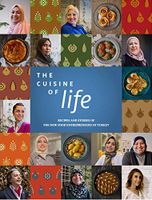Advertisement
Migration and the Kitchen
Appears in
By Center for International Private Enterprise
Published 2019
Cuisine is one of the most important indicators of culture, both socially and individually. Origin and belonging are important, but changes to a cuisine caused by immigration are undeniable. Globalization only makes these changes more complex: constant change inevitably affects culinary culture, as migration by its very nature implies adaptation.
I’m Circassian (Adyghea/Shapsug) and my ancestors are Caucasian immigrants. Our traditions have transformed over the last 150 years — we do not serve dozens of dishes at once like our grandmothers did, but we still keep the scent and colorfulness from long ago. There is an old Adyghe saying: “Bisimir hesch’em yi ‘wexwthebzasch’esch” — the host is the guest’s servant, meaning the host should strive to please their guest, adapting as necessary to accommodate them. The same could be said for the countries in which immigrants move to — they must let new members of their society feel welcome. In return, newcomers will adapt and learn to live in their new home, set down roots and start businesses, and pass some of their culture on to new generations from a variety of backgrounds.

